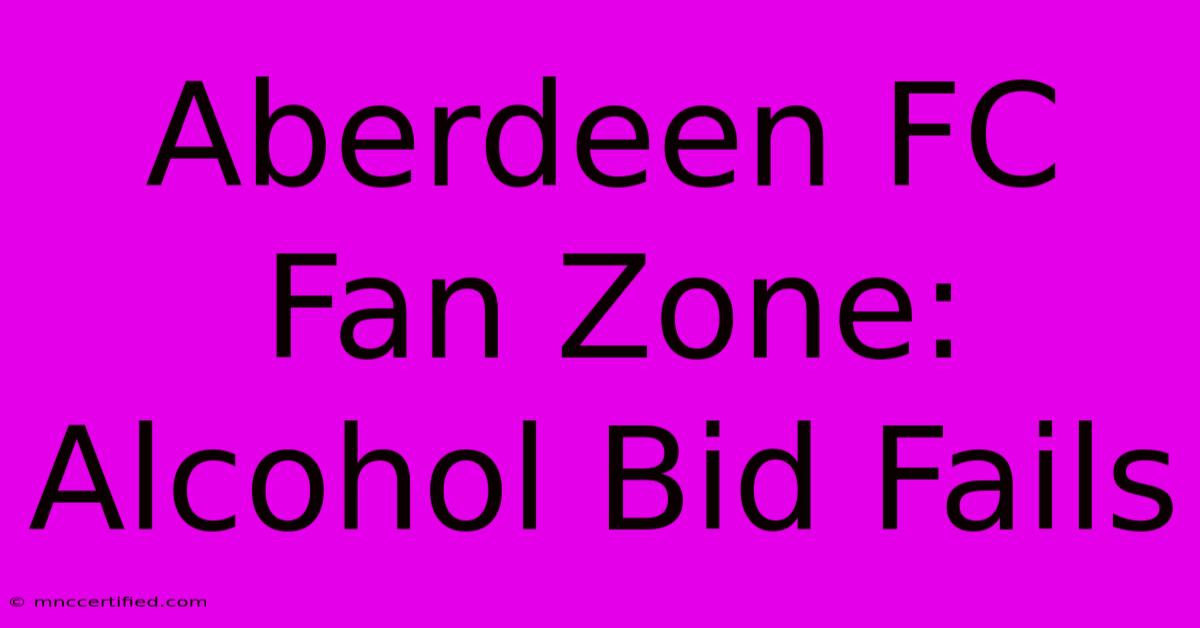Aberdeen FC Fan Zone: Alcohol Bid Fails

Table of Contents
Aberdeen FC Fan Zone: Alcohol Bid Fails – A Setback for Supporters?
The recent rejection of Aberdeen FC's bid to serve alcohol in their proposed new fan zone has left supporters disappointed and questioning the future of the project. This article delves into the reasons behind the council's decision, the implications for the club and its fans, and explores potential alternative solutions.
Why the Alcohol Bid Failed
Aberdeen City Council's planning committee voted against the club's application to allow alcohol sales within the planned fan zone, citing concerns about potential public disorder and the impact on the surrounding community. This decision, while seemingly straightforward, is a complex issue touching upon several factors:
-
Concerns about Public Order: The council's primary concern revolves around the potential for increased anti-social behaviour linked to alcohol consumption. Previous incidents in the city, unrelated to Aberdeen FC, might have influenced this cautious approach. The committee may have felt that the existing measures proposed by the club were insufficient to mitigate these risks.
-
Proximity to Residential Areas: The location of the proposed fan zone, its proximity to residential properties, and the potential for noise and disturbance were likely key factors in the council's decision. Balancing the needs of football fans with the peace and quiet of nearby residents is a delicate task.
-
Licensing Regulations: Strict licensing regulations and the council's overall policy regarding alcohol sales in public spaces likely played a significant role. The application might not have fully met the criteria outlined in these regulations, leading to its rejection.
-
Lack of Community Engagement: While the club might have undertaken some consultation, a perceived lack of comprehensive community engagement could also have contributed to the negative decision. A more thorough and inclusive consultation process could potentially have addressed some of the council's concerns.
Implications for Aberdeen FC and its Fans
The rejection of the alcohol license significantly impacts the viability and appeal of the proposed fan zone. For fans, it means a less vibrant and potentially less attractive pre-match atmosphere. This could:
-
Reduce Fan Attendance: Many fans enjoy a pre-match drink, and the inability to do so in the fan zone might discourage some from attending. This could negatively impact matchday revenue and atmosphere.
-
Limit Community Engagement: The fan zone was envisioned as a space for the community to gather, not just on matchdays. Restricting alcohol sales might limit its attractiveness to a wider audience, impacting its overall success.
-
Impact Club Revenue: The sale of alcohol was expected to contribute to the fan zone's financial sustainability. The lost revenue stream could hinder the project's long-term viability and limit the club's ability to invest in other areas.
Potential Solutions and Next Steps
Aberdeen FC now faces the challenge of re-evaluating its plans. Potential solutions could include:
-
Appealing the Decision: The club could appeal the council's decision, presenting further evidence to address their concerns.
-
Revised Application: Submitting a revised application with stricter measures to control alcohol consumption and mitigate noise and public order issues. This might involve implementing stricter security protocols or reducing the capacity of the zone.
-
Alternative Revenue Streams: Exploring alternative revenue streams to compensate for the loss of alcohol sales, such as food concessions or merchandise sales.
-
Enhanced Community Engagement: Focusing on improved community engagement to alleviate concerns and build support for the project.
The rejection of the alcohol license is a significant setback, but not necessarily a death knell for the fan zone project. How Aberdeen FC responds to this challenge will be crucial in determining the future of this important initiative for the club and its supporters. The ongoing dialogue between the club and the council will be pivotal in finding a solution that balances the needs of football fans with the concerns of the wider community.

Thank you for visiting our website wich cover about Aberdeen FC Fan Zone: Alcohol Bid Fails. We hope the information provided has been useful to you. Feel free to contact us if you have any questions or need further assistance. See you next time and dont miss to bookmark.
Featured Posts
-
Farm Bureau Proof Of Insurance
Nov 27, 2024
-
One Killed In Lithuanian Dhl Cargo Crash
Nov 27, 2024
-
Insurance Claim Letter Example
Nov 27, 2024
-
Verne Hart Insurance Marion Oh
Nov 27, 2024
-
Spin Lainey Wilsons Country Girl
Nov 27, 2024